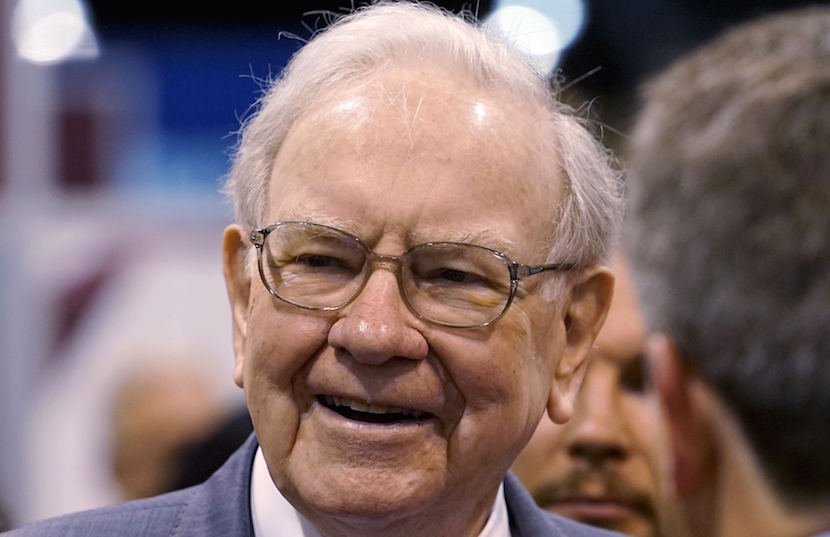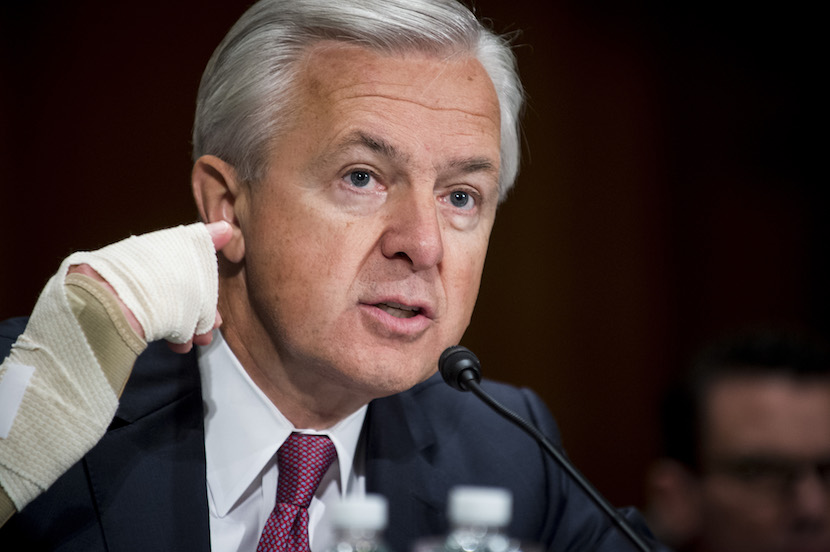
For thousands of years, the Good Book has taught us everything has its season. For traditional banking, the time of plenty is very much over. Perhaps forever. Any lingering doubts were wiped away in Washington yesterday when politicians flayed the chief executive of the US’s most valuable banking group, Wells Fargo (mkt cap: $237bn). The lashing was ostensibly over 5 300 employees who, without the permission of their customers, opened 2m new bank accounts for them. In a classic consequence of misdirected incentives, they committed fraud to meet sales targets. The employees directly involved have been fired. But US politicians from both sides of the aisle want richer blood. The charge is being led by former commercial law professor Elizabeth Warren, one of five people shortlisted to be Hillary Clinton‘s Vice President running mate. Reflecting the public’s continued anger at banks, Warren demanded the Wells Fargo CEO’s resignation. John Stumpf refused to fold. But more worrying for him and his bank is how its bigger shareholder will react. Berkshire Hathaway’s chairman Warren Buffett has this far been publicly silent on the scandal, but insiders say he sent a signal intent when, in the middle of the hearings, he announced the appointment of his portfolio manager Todd Combs onto the board of Wells Fargo’s rival JP Morgan. Buffett rarely sells shares he buys – except when he discovers management can no longer be trusted. When that happens, he acts rapidly and is prepared to accept losses to exit: as he did in 2015 when taking a $444m knock on selling Berkshire’s entire holding in scandal-wracked Tesco. Buffett’s business owns 9.5% of Wells Fargo, a $22.5bn investment. His departure is sure to send the already hard hit share price lower still. – Alec Hogg
By
(Bloomberg) — John Stumpf arrived at Tuesday’s Senate Banking Committee hearings with one hand in a bandage. He left even more battered and bruised.

The Wells Fargo & Co. chief executive officer took fire from Democrats and Republicans alike, who blasted the executive’s handling of a scandal over the opening of more than 2 million accounts without customers’ authorization, as employees sought to meet cross-selling targets.
“You should resign,” Senator Elizabeth Warren told Stumpf, who had injured his right hand while playing with his grandchildren. “You should give back the money you took while this scam was going on and you should be criminally investigated by both the Department of Justice and the Securities and Exchange Commission.”
Warren, a Massachusetts Democrat, led a chorus of criticism as lawmakers demanded more accountability from the company’s leadership and made clear the San Francisco-based firm is far from putting the matter behind it. Bank executives are “completely out of touch,” Patrick Toomey, a Republican from Pennsylvania, told Stumpf.
“This isn’t cross-selling, this is fraud,” Toomey said.
‘Deeply Sorry’
Well Fargo agreed to pay $185 million to authorities including the Consumer Financial Protection Bureau after a review found employees opened accounts and credit cards without customers’ permission. Stumpf told lawmakers he was “deeply sorry” and detailed a five-year timeline of attempts the bank made to deter misconduct.
“The Wells Fargo board is actively engaged in this issue,” Stumpf, 63, said in his prepared remarks. “The board has the tools to hold senior management accountable, including me and Carrie Tolstedt, the former head of our retail banking business. Any board actions taken with our named executive officers will be appropriately disclosed, and I want to be clear on this, I will respect and accept the decision of the board.”
Tolstedt’s Retirement
Wells Fargo said it expanded its internal review of the matter to include 2009 and 2010 and is contacting all customers nationwide to ensure their accounts and credit cards are products they need and want. The bank announced in July that Tolstedt was retiring, and said on Monday that Claudia Russ Anderson, who had overseen risk in the retail-banking unit, is taking a six-month unpaid leave for personal reasons.
“Carrie chose to retire,” Stumpf said, adding that he and Chief Operating Officer Tim Sloan told her the bank wanted “to go in a different direction.” She was eligible for retirement “and she decided to retire” after that conversation, Stumpf said.
How many people at Wells Fargo are going to jail? Zero. But if you smoke marijuana in this country, you get a criminal record.
— Bernie Sanders (@SenSanders) September 20, 2016
Warren criticized Stumpf for pushing the blame to lower-level employees. “It’s gutless leadership,” she said.
The tenor of the hearing contrasts with JPMorgan Chase & Co. CEO Jamie Dimon’s testimony before the same committee in June 2012 on the so-called London Whale trading debacle, in which the bank lost more than $6 billion on botched derivatives bets. While some lawmakers grilled Dimon over the incident, others apologized for questioning him or sought his opinion on subjects including regulation and the national budget.
Credit Scores
Senator Sherrod Brown, an Ohio Democrat, told Stumpf that the bank’s response has been inadequate, and said, for example, that Wells Fargo hasn’t yet calculated what effect lower credit scores resulting from the unauthorized accounts might have had on customers’ finances. Senior management downplayed the importance of the problem and continued to award performance bonuses to those involved as recently as two months ago, Brown said.
“You would think the lessons of the financial crisis, which came at such a high cost to our country, would change the way banks do business,” Brown said.
Other witnesses Tuesday include U.S. Comptroller of the Currency Tom Curry, who said in prepared remarks that he’s directing bank examiners to review sales practices at all “large and mid-size banks,” and that the agency could pursue its own enforcement action against people at Wells Fargo.
Employee Dismissals
Wells Fargo said that in 2011, a dedicated team began to monitor and root out improper sales, adding that the firm started terminating roughly 1,000 of its 100,000 retail banking employees annually for violations. By 2012, the lender began lowering some sales goals for compensation. Stumpf said he first became aware late in 2013 that phony accounts were being opened.
In 2015, an OCC review of Wells Fargo’s sales practices revealed shortcomings that prompted the agency to demand changes — including telling the bank to compensate customers for any harm suffered. The company had to bring in an outside consultant, Curry said. Wells Fargo hired PricewaterhouseCoopers in August 2015 to help determine whether customers were hurt, according to Stumpf.
How different would Obama's first term be if he had people like Elizabeth Warren in his inner circle instead of Summers, Rahm, Daley, Dunn
— Lee Fang (@lhfang) September 20, 2016
The CEO outlined other ways Wells Fargo has tried to prevent unauthorized accounts from being created, including working with regulators and creating a new branch compliance program.
Clawback Question
A group of Democratic senators led by Warren last week wrote a letter pressing Stumpf with questions on pay. The lawmakers singled out Tolstedt, writing that there appears “to be multiple grounds on which to trigger the clawback provisions to recoup some or all of Ms. Tolstedt’s incentive rewards.”
Stumpf in his testimony said the bank didn’t notify the SEC about the matter because “it was not a material event.” The SEC conducts civil investigations but can only make referrals to the Justice Department on potential criminal matters.
After the first round of questioning most Republican senators left the hearing, leaving round two to Warren and other Democrats.
Bank ‘Cheats’
“In 2008, Wall Street promised change,” Warren said. “But it looks like it is business as usual. A giant bank cheats the little guys and the executives line their own pockets. Mr. Stumpf, you make it clear that Wall Street won’t change until we make it change.”
The House Financial Services Committee, led by Chairman Jeb Hensarling, said last week it also plans to conduct its own investigation and will hold a separate hearing later this month. Hensarling, a Texas Republican, said he plans to request that Stumpf appear for that hearing, too. Tolstedt as well as other corporate officers will be called for transcribed interviews, the lawmaker said.

